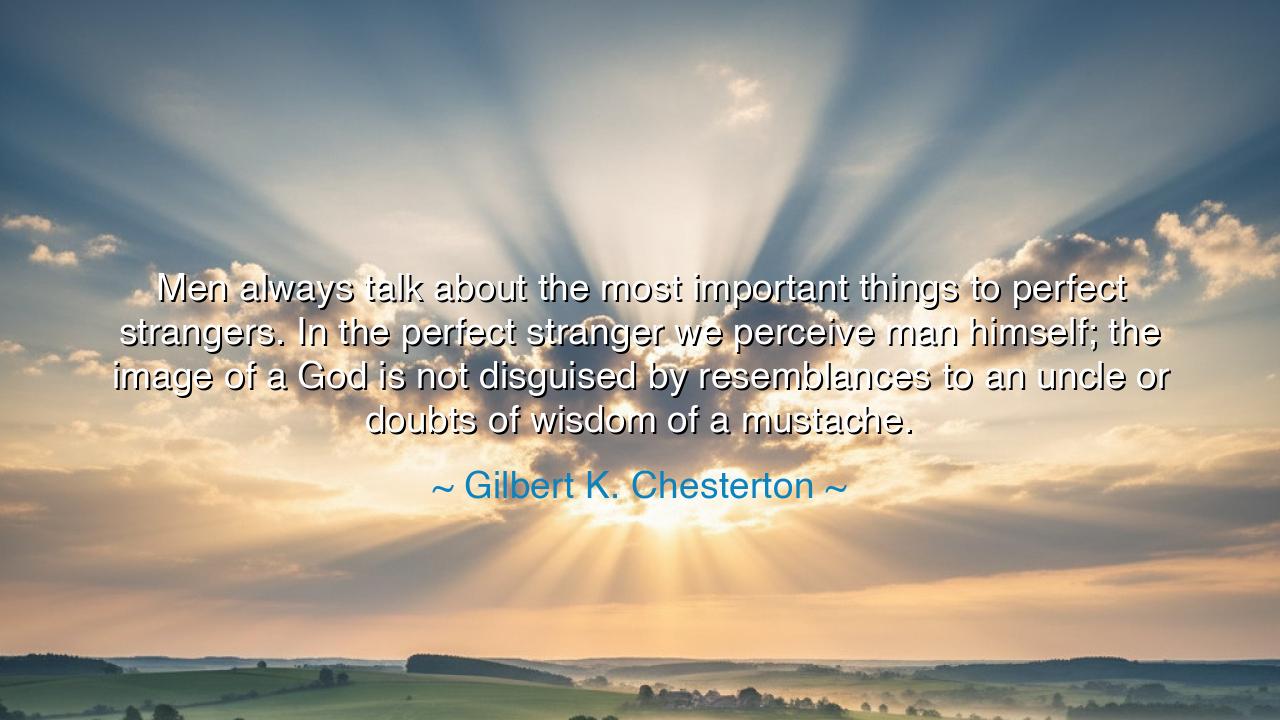
Men always talk about the most important things to perfect
Men always talk about the most important things to perfect strangers. In the perfect stranger we perceive man himself; the image of a God is not disguised by resemblances to an uncle or doubts of wisdom of a mustache.






Gilbert K. Chesterton, with his paradoxical brilliance, declared: “Men always talk about the most important things to perfect strangers. In the perfect stranger we perceive man himself; the image of a God is not disguised by resemblances to an uncle or doubts of wisdom of a mustache.” These words uncover a hidden truth about the human soul—that it is often with the unknown, not the familiar, that we reveal our deepest selves. For in the face of the stranger, the spirit sees humanity without the distortions of kinship, rivalry, or judgment.
The perfect stranger is like a mirror free of blemish. With family, friends, and neighbors, we are burdened by memory, expectation, and habit. The father reminds us of duty, the uncle of authority, the mustache of folly. But with one we do not know, these layers vanish, and what remains is the pure encounter between soul and soul. Thus, Chesterton teaches that the image of God—the divine spark in man—shines most clearly when freed from the clutter of familiar prejudice.
History itself confirms this mystery. Recall the tale of the Good Samaritan. The wounded man, ignored by those of his own people, was saved by a stranger, one who bore no kinship to him. In that moment of encounter, the Samaritan revealed the essence of true humanity—compassion undimmed by tribe or title. The lesson is clear: it is often the stranger, not the familiar face, who draws from us the noblest truths of our being.
Even in the realm of thought, this holds true. The ancient philosophers of Athens would often converse with wanderers in the marketplace. To them, the stranger was not an intruder but a vessel of perspective unclouded by local ties. Socrates himself, that gadfly of Athens, used dialogue with strangers to peel away the illusions of his fellow men and reveal the essence of wisdom. Thus, in speaking to those we do not know, we often speak most freely, most honestly, and most deeply.
O children of tomorrow, learn from Chesterton’s paradox. Do not fear the stranger, for in him you may glimpse the universal man, the soul unclothed of petty disguises. Speak with openness, for sometimes your truest words will be heard not by kin but by one who carries no judgment of your past. Remember: it is in the eyes of the stranger that we often see both ourselves and the image of God, shining unmasked by the trivialities of familiarity.






LLuat
This quote sparks reflection on trust, vulnerability, and revelation. Is the reason we confide in strangers because they represent a kind of untarnished perspective on life, unlike familiar faces that bring baggage and assumptions? I also wonder how this aligns with modern digital communication, where strangers are often the recipients of our deepest thoughts online. Does technology enhance this phenomenon, or does it dilute the authenticity that Chesterton describes?
YLYen Le
I feel a mix of fascination and skepticism here. While the idea of seeing 'man himself' in strangers is compelling, is it truly possible to strip away all personal and cultural biases in perception? Could this perspective be idealistic, or does it reflect a deeper truth about the human longing for understanding beyond superficial identities? I’m interested in exploring whether this experience of strangers as mirrors is universal or culturally dependent.
UGUser Google
This statement makes me wonder about the role of perception in communication. Does the 'perfect stranger' allow us to elevate ordinary conversations to a quasi-spiritual level, free from trivial associations? How much of our honesty is sacrificed when we speak to those who already know us well? I’d love to hear perspectives on whether human connections are inevitably more profound with distance, anonymity, or objectivity, rather than with intimacy and history.
UGUser Google
I find this thought both poetic and unsettling. It raises a question: do we consciously seek strangers to discuss profound topics, or is it an unconscious need to avoid the risk of misunderstanding from those who know us? I’m curious whether this behavior stems from a desire for validation of our innermost ideas or a search for the pure, unfiltered reflection of what it means to be human.
TNPhan Thi Thanh Nhan
Reading this, I feel intrigued by the idea that strangers allow us to connect with the essence of humanity itself. Could it be that in familiar relationships, our perception of others is always clouded by preconceptions and biases, whereas strangers offer a mirror to the universal human experience? I’d like to explore how this phenomenon impacts trust, empathy, and even self-discovery. Are we more authentic in the company of those who know nothing about us?